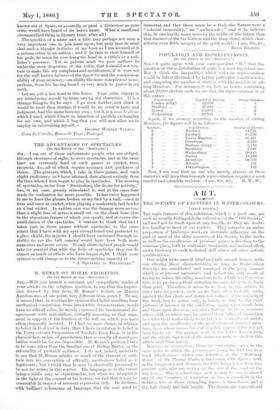M. RENAN ON MORAL PROBATION.
[To TILE EDITOR OF THE "SPECTATOR.") SIR,—Will you permit a constant and sympathetic reader of your articles on the religious question, to say that the impres- sion derived by him from M. Renan's lecture on Marcus Aurelius was, at one point, very different from yours ? To me, it seemed that, in avowing his opinion that belief resulting from mechanical compulsion, from irresistible demonstration, would have no ethical value, be merely expressed his fundamental dis- agreement with materialism, virtually assenting to that argu- ment in support of the freedom of the will on which you have often eloquently insisted. If I had no more choice, in relation to belief in God and in duty, than I have in relation to belief in the Forty-seventh Proposition of Euclid's First Book, or in the physical fact, or law, of gravitation, then assuredly all moral pro- bation would be, for me, impossible. M. Renan's position I take to be none other than the familiar one of Bishop Butler, on the rationality of probable evidence. I do not, indeed, undertake to say that M. Renan admits so much of the element of certi- tude into his conception of ethically meritorious belief as is legitimate ; but I think that he may be charitably presumed to be not far astray in this matter. His language as to the future being a riddle may be objectionable, but when we interpret it in the light of the context of his lecture, we find that it may be censurable in respect of reverent expression only. He declares, with brilliant vehemence of language, that the soul must be
immortal, and that there must be a God, else Nature were a "colossal immorality," an " ambuscade ; " and if he believes this, he can hardly mean more by the riddle of the future than that dimness of the far horizon and the filmy cloud, which char- acterise even Bible imagery of the spirit world.—I am, Sir, &c.,
ELLIS BRANDT.


































 Previous page
Previous page